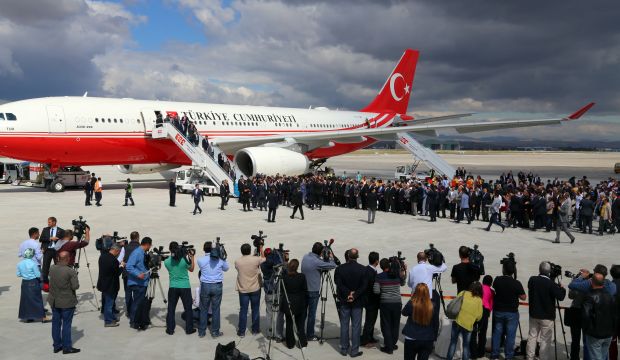
Freed Turkish hostages are welcomed at the airport in Ankara, Turkey, Saturday, September 20, 2014. (AP Photo)
Prime Minister Ahmet Davutoğlu announced during a visit to the Azerbaijani capital Baku that the hostages had been safely returned to Turkey during the early hours of Saturday after efforts by Turkey’s intelligence agency MİT, carried out using the agency’s “own methods.”
President Recep Tayyip Erdoğan, meanwhile, said the release was part of a “pre-planned operation.”
The hostages, who included diplomatic staff and their families, were captured on June 12 from the Turkish consulate in Mosul, after ISIS fighters overran the city, and had spent over three months in captivity.
But questions linger over how the Turkish security services got the hostages out from Mosul and into Turkey—especially if reports are confirmed that this was carried out via areas in Syria currently controlled by ISIS—and over the timing of the release, which comes as Turkey declined to join a US-led international coalition to combat the extremist group, citing the hostage situation as the main reason for its non-involvement.
Official details have thus far been scarce on the operation and how the release of the hostages was secured. Foreign Minister Mevlüt Çavuşoğlu said the operation was the result of “long-term efforts carried out patiently, meticulously and covertly.” He said promises were made by ISIS during indirect communications with the group using outside “mediators,” with Ankara giving ISIS “until September 20 . . . to return them [the hostages], which is why the operation was carried out on that date.”
But a Turkish opposition figure, who requested anonymity, said the information available thus far on the release operation was “questionable,” pointing to reports that the hostages had reached Turkey via Tal Abyad in Syria, an area controlled by ISIS, passing through the area without any incidence of gunfire or fighting, which he said proved they were not “released by force,” that there had been no fighting between ISIS and Turkish forces.
The suspicions over the operation were not confined to Turkey’s opposition, however. Şamil Tayyar, a member of the ruling Justice and Development Party (AKP), said on his Twitter account that the entire operation had been organized by the CIA, following Turkey’s refusal to join the US-led coalition against ISIS due to the hostage situation, in order to expedite Ankara’s joining the alliance.
But Turkish sources with knowledge of the situation contradicted this allegation, saying the operation was carried out entirely by the Foreign Operations department at the MİT, with no foreign actors involved. After careful study of other recent abductions carried out by ISIS, a “long-term operation to free them [the hostages] safely” was launched, they added.
They said the hostages and their captors had been monitored continuously throughout their entire captivity by both agents stationed in the area and drone aircraft, especially since following their capture the hostages were divided into different groups, each held in one of eight different locations in the city.
The sources said there had been up to six opportunities recently to free the hostages but that these were not capitalized upon due to fierce fighting raging between the group and forces loyal to the Syrian–Kurdish Democratic Union Party (PYD).
Despite agreeing with some of those suspicious of the operation regarding the hostages entering Turkey via Syria, the sources insisted Turkey had not paid any ransom to ISIS, nor met any demands previously made by the group in order to free the hostages.
Contradicting these accounts, one political activist activist from Mosul, who requested anonymity, told Asharq Al-Awsat via the telephone that there had been an agreement between both sides, which included Turkey supplying arms to the group, allowing it to use its borders to ferry recruits from Europe into Syria and Iraq, and attacking fighters loyal to the PYD.
While the circumstances surrounding the return of the Turkish hostages remained unclear, a dramatic surge in refugees crossing into Turkey over the weekend highlighted ISIS’s continuing efforts to tighten its grip in Syria and Iraq.
Almost 70,000 refugees, mostly Syrian Kurds, reportedly fled into Turkey in the space of 24 hours at the end of last week, after ISIS launched an offensive close to the town of Ayn Al-Arab—known as Kobani in Kurdish—on the the Syrian-Turkish border.
After visiting the embattled town, an MP for Turkey’s Peoples’ Democratic Party, Ibrahim Binici, told Reuters that ISIS was waging a terror campaign against the area’s population.
“Rather than a war this is a genocide operation . . .They are going into the villages and cutting the heads of one or two people and showing them to the villagers,” he said.
In response, the Kurdistan Worker’s Party (PKK)—which carried out an insurgency campaign against the Turkish state in an attempt to win Kurdish autonomy between 1984 and 2013—called on Turkish Kurds to join Syrian Kurdish militias attempting to repel ISIS attacks across the border in Syria.
In a statement posted on its website, it said: “Supporting this heroic resistance is not just a debt of honor of the Kurds but all Middle East people. Just giving support is not enough, the criterion must be taking part in the resistance.”
Anticipating further fighting, the UNHCR and the Turkish government said they were preparing to receive even more refugees in the near future, joining the estimated 800,000 currently sheltering in Turkey, in both official refugee camps and in border towns and cities.
Dalshad Abdullah contributed reporting from Erbil.

Trackbacks/Pingbacks